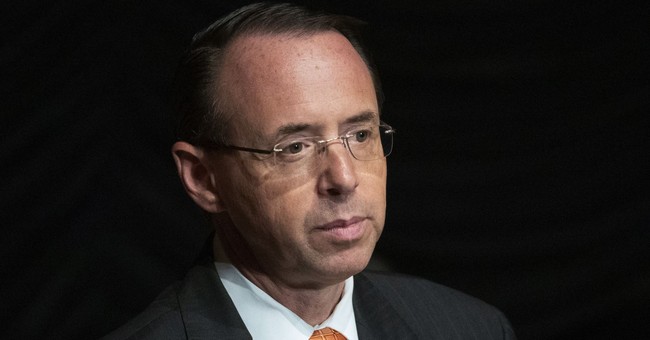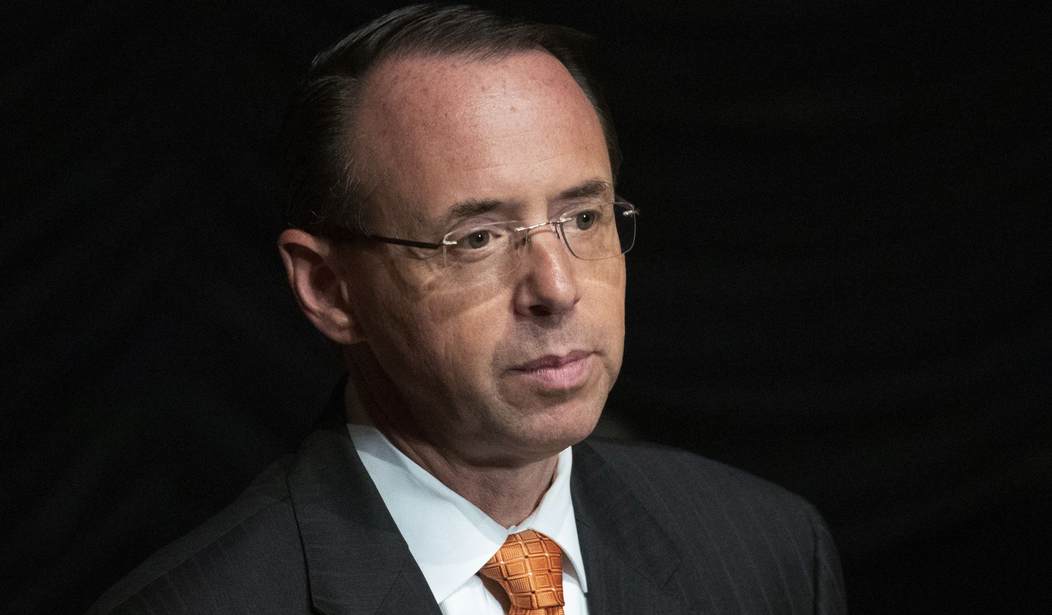
Most who are reading this have probably heard this story by now – DOJ prosecutors headed up by Rod Rosenstein and Andrew Weissman, in a politically charged investigation, violated DOJ written policy in order to secure a plea agreement in a criminal case that advanced their interests in steering the case to a particular outcome having nothing to do with the merits.
I mentioned one time they did that in this story regarding the farcical reporting on the Flynn case by the non-lawyers at Lawfareblog.
Abbreviated version – a written DOJ policy tells federal prosecutors that they must charge a defendant with the most serious readily provable offense, and any plea agreement entered into with such a defendant must include a guilty plea to the most serious readily provable offense. The policy states that the most serious readily provable offense is that which would carry the longest potential term of imprisonment.
Gen. Flynn was made to plead guilty to a single count of having violated 18 USC § 1001. But as part of that plea deal, he was required to admit to facts of “uncharged conduct” which the government claimed showed he had also violated the Foreign Agents Registration Act (FARA). From a sentencing standpoint, the FARA conduct would have been the more serious crime. The conduct of the Special Counsel – under Rosenstein’s supervision as Deputy Attorney General – violated the DOJ policy by not allowing a defendant to plead guilty to a less serious charge. Under DOJ regulations, the Special Counsel’s Office was required to follow all written DOJ policies.
But violating DOJ written policies was a path that Rosenstein and Andrew Weissman – the real “leader” of the SCO’s operation – were already well familiar with.
I was reminded of this fact when I recently picked up – again – Andy McCarthy’s tremendous book “Ball of Collusion” where he recounted one part of the infamous “Uranium One” scandal involving the Obama DOJ and Hillary Clinton.
Vadim Mikerin was a Russian national who obtained a visa to come to the US and served as CEO of Tenex, subsidiary of the Russian energy giant Rosatom. The business of Tenex was to import weapons-grade uranium from disassembled Soviet-era nuclear weapons, which were then “degraded” into uranium which could be sold for use in nuclear power plants. A criminal investigation revealed that Mikerin was soliciting huge bribes and kickbacks from US contractors, and using the money to pay government and industrial officials back in Russia.
A “cooperating witness” who had served as a Tenex lobbyist came to the FBI and reported what was happening. But DOJ and the FBI did not take action against Mikerin, Tenex, or Rosatom between 2010 when it first learned of the bribes and kickbacks, and the summer of 2014 when arrests finally took place.
What happened in that time period? As counted in great detail by McCarthy, this was the infamous Obama Admin. era of “engagement” with Putin’s Russia, highlighted by Hillary’s farcical “Reset” button meeting, and Pres. Obama’s embarrassing “hot mic” moment where he was caught advising then Russian Pres. Dmitry Medvedev to tell Putin that after the 2012 election, Obama would have more “flexibility” on certain issues of disagreement between the two sides.
But notwithstanding all the “efforts” by the Obama Administration to suck-up to Vladimir Putin by tilting US policy in favor of Russia between 2010 and 2014, in March 2014, Russia invaded and seized the Crimea region of Ukraine, and annexed it as Russian territory.
As McCarthy notes, even though DOJ had a prosecutable case backed by cooperating witness testimony in 2010, it wasn’t until after the collapse of Obama Administration “cooperation” with Russia after the invasion of Crimea that the Obama DOJ decided “enough was enough”, arresting Mikerin in the summer of 2014. Tenam’s US headquarters were in Bethesda, Maryland – and the US Attorney for the District of Maryland at that time was none other than Rod Rosenstein.
Mikerin was eventually indicted in November 2014 on multiple felonies involving bribery, extortion, and money laundering, some of which had maximum potential sentences of up to 20 years. As is often the case in large-scale, or international fraud cases such as the Tenam/Mikerin case, trial attorneys from the DOJ Fraud Section had joined the prosecutors from Rosenstein’s office in handling the matter. The head of the DOJ Fraud Section at the time was Andrew Weissman.
In August 2015, with the Presidential Primary season underway, a quiet agreement was reached between Rosenstein and Weissman’s prosecutors, and Mikerin’s defense attorneys, which allowed Mikerin to plead to single conspiracy count under 18 USC § 371 – which had a maximum sentence of only 5 years. Mikerin was ultimately sentenced to only 4 years in custody.
The terms of that disposition violated another written DOJ policy. The “conspiracy” to which Mikerin pleaded guilty was a “money laundering” conspiracy as described in the “Superseding Indictment” and the plea agreement.
But the federal money laundering statute, 18 USC § 1956, includes its own provision on “conspiracies”, and a § 1956 conspiracy charge carries a potential maximum sentence of 20 years imprisonment.
It has always been DOJ policy that when Congress has provided a specific conspiracy charge as part of a statute defining a substantive offense, a federal prosecutor must charge conspiracy under that statute, and not the “general” conspiracy charge under § 371.
By violating the policy, Rosenstein and Weissman’s prosecutors were able to dramatically reduce the potential jail time Mikerin was facing, induce him to accept the plea agreement being offered, and have the case quietly disappear without embarrassing the Obama Administration or the emerging Clinton campaign.
No triumphant press release or a press conference in a case involving the CEO of a division of a giant Russian energy company, where millions of dollars in bribes were ACTUALLY paid to Russian energy and government officials, and a dubious charge made in violation of DOJ policy selected to achieve an obvious political goal — sweep the dirt under the rug and hope no one notices.
There was an election to win, after all.














Join the conversation as a VIP Member